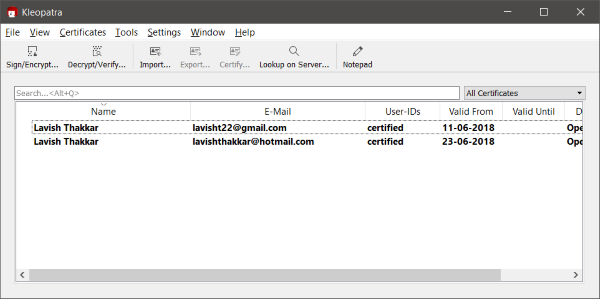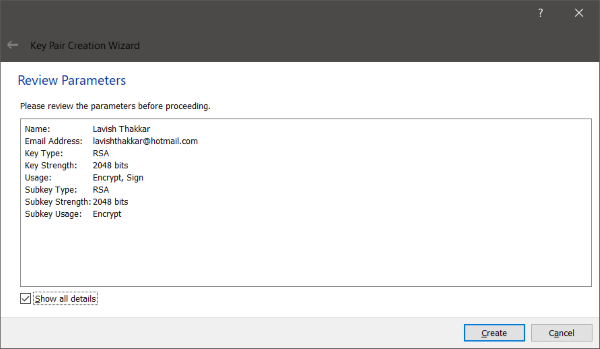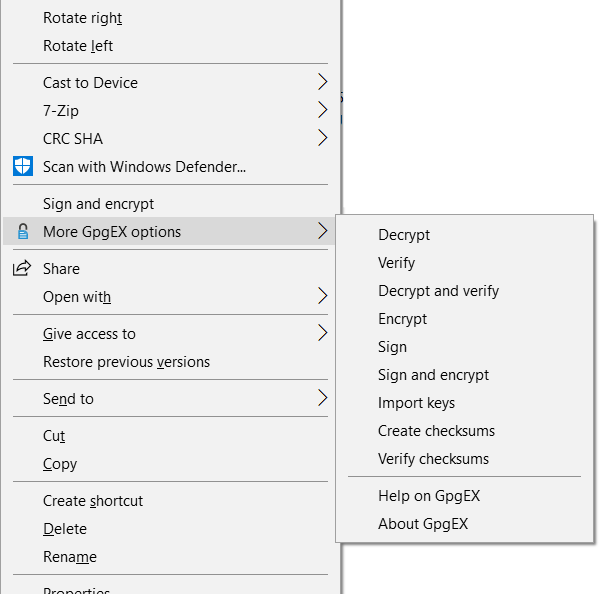Signing and encryption have almost become a day to day task of some users. While encryption makes your file unreadable to unauthorized users, signing helps you in claiming and verifying the integrity of a file. A plethora of tools are available that are suited to this task. But what is the best ways and best practices to follow while signing or encrypting your file? What is the best industry accepted standards? In this post, we’ve covered a tool called Kleopatra that lets you encrypt or sign your files using the OpenPGP standards.
What is OpenPGP
OpenPGP is a protocol which was originally meant for encrypting communications such as emails. This protocol/standard defines techniques, methods, and formats of encrypted data and certificates. GnuPG is an open source implementation of OpenPGP standards, and it allows you to sign and encrypt your files. It is basically a command line tool and a little difficult to get along. The tool that we are going to talk about today, Kleopatra is a GUI implementation of GnuPG.
Sign & Encrypt files using Kleopatra

The tool is a certificate manager and a GUI for GnuPG. It allows you to create certificates, sign and encrypt your files with just a few clicks. Given its capabilities, the tool is quite simple to use and understand. It hides all the complexities involved in operations such as signing and encryption.
Before performing any signing and encryption, you need to create your own certificate or key pair. You can simply hit Ctrl+N to create a new key pair, or you may import existing certificate files if any available. The program supports almost all certificate formats.
If you are creating a new key pair, Kleopatra will make it very simple and straightforward with its Key Pair Creation Wizard. In the first step, you can choose whether you want to create an OpenPGP or an X.509 key. Then you can optionally enter your name and email in the next step. While most of the users might go the next step from here but the tool also provides you with some advanced settings.

You can decide the encryption algorithm and specify in what cases will this certificate be used. Lastly, you can also create a certificate that is only valid until a certain period. In the last step, you can enter your passphrase, make sure you remember this as you will not be allowed to carry out any operations on this certificate without the passphrase.
Signing and Encryption
So that was about generating your key pair or your certificate. Now it is time to sign or encrypt your files. Kleopatra makes it very simple to do that by introducing a right-click context menu. So, you can right-click any file and select ‘Sign and encrypt’. Or if you just want to sign and skip encryption, you can click on More GpgEX Options and select a relevant option.

You can also encrypt or sign your files from the main application. You can sign a file using any of the certificates that you previously created or imported. After signing is complete, a .sig file will be created in the same directory. And this file can be used to validate the integrity of the file you signed. If the file were modified after you’ve signed it, the .sig file would show you an invalid signature.
Kleopatra is a great tool to manage file signing and encryption. It is useful in many test cases and can help you secure your files and information. It uses some of the best standards underneath, and the GUI makes it quite simple to deal with such complex operations. Click here to download Kleopatra.
After signing/encrypting with Kleopatra, is there an Android app that can decrypt and re-encrypt those files?
I don´t understand how to download
Click the word “here” in the very last sentence of the article: “Click here to download”.
I see what Marcus is talking about; I just spent ten minutes checking all sorts of links at the site this story itself links to…lots of talk about Kleopatra and other apps there, but none has a download link, each linked page says last updated October 2016. I’m in Nevada USA…maybe site or ISP region blocks?